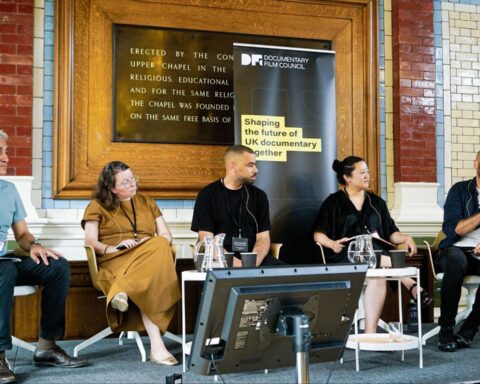Thought Crimes
USA, 80 min.
Directed by Erin Lee Carr
International Premiere
New Yorker Gil Valle didn’t merely post deviant thoughts on a fetish website, he indulged in sickening exchanges about stalking and kidnapping women, roasting them, and eating their cooked flesh. Even in the realm of monstrous fantasies, Valle and his Internet cohorts descended into a unique masturbatory swamp.
The fact that Valle was a married cop with a baby who in the wee small hours engaged in maniacal meanderings delighted the tabloids, which enthusiastically referred to him as “The Cannibal Cop.”
Thought Crimes, Erin Lee Carr’s new doc raises the issue of whether anyone, even someone like Valle, can be condemned and punished for their thoughts, particularly when these are relayed online. Remember the nightmare that befell Orwell’s Winston Smith in 1984 when he dared to write “Down with Big Brother” in his illegal diary?
In fact, the U.S has no thought crime laws, but a jury found Valle guilty after being subjected to his grotesque verbal and visual postings. The courtroom artist, whose elegant work is one of the doc’s visual components, points out that this was the first time she drew naked women hanging by their ankles.
The jury also took into consideration Valle’s exhibition of his wife and baby on the site, his illegal accessing of NYPD data to track down potential victims, and his research into kidnapping and chloroforming techniques. Valle seemed to be engaged in a conspiracy with his fellow techno-perverts. Moreover, in some web postings he said he was fantasizing, while in others, he told his online pals that he was serious.
Valle got sentenced to life although, as the movie shows us, a judge nullified the verdict and placed the cannibal cop into a limbo state between guilt and innocence. He awaits the next legal procedure while he cooks for his overbearing mother, pets his extraordinarily ugly, shoe-eating dog, communicates with his 440 current Facebook friends, and tries to figure out how a guy who dreams about roasting women alive can sell himself on dating sites.
Thought Crimes gets very close-up and personal with this character, showing him in his mother’s house where he is confined. Divorced from Vallee’s dad, she has supported him 100% because Gil is such a beloved boy; we get the impression she may have infantilized him. At one point he actually says, “I would never hurt a fly,” seemingly unaware of Norman Bates’s last line as the voice of his demented and deceased mother in Psycho.
Yes, separated from his computer keyboard, Gil seems harmless. But among the various ambiguities floating through the film, the What If? factor is disturbing. How can we be absolutely sure that people like Gil won’t cross over from writing into violence?
Some point to the thoughts of writers like Stephen King and Clive Barker, not to mention the creators of the Saw franchise. Nobody’s going to arrest them for their horrific fantasies, at least not until the agents of the state burn all the nasty books (a la Fahrenheit 451). There’s big difference between an artist who allows audiences to safely entertain their darkest fears and some guy with one hand on his junk and the other on his keyboard drooling over the idea of fileting his high school girlfriend.
Thought Crimes deploys a slick amalgam of graphics, screen shots of postings and emails, interview subjects, and the principal players. But as the film plays out, it starts circling back on itself, repeating arguments about the case, and the issue it invokes that you’ve already heard about, At one point, I seemed to be seeing Alan Dershowitz make a point that he had already expounded, as if the editor inadvertently recycled the same clip.
HBO, according to Carr, commissioned the project before doc series The Jinx, about suspected millionaire murderer Robert Durst, went into production. At a Hot Docs Q & A, she noted a “renaissance of true crime” shows. Thought Crimes is certainly part of that renaissance.
Hot Docs 2015 Screenings
Thu, Apr 30 4:15 PM
TIFF Bell Lightbox











